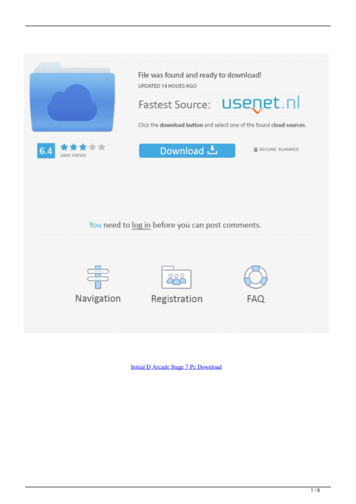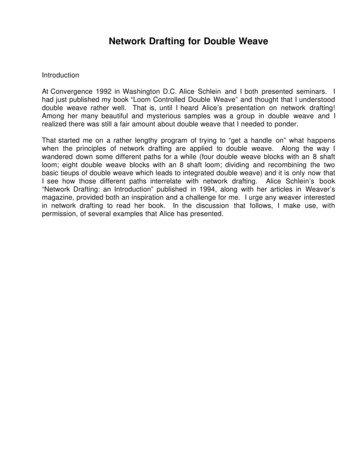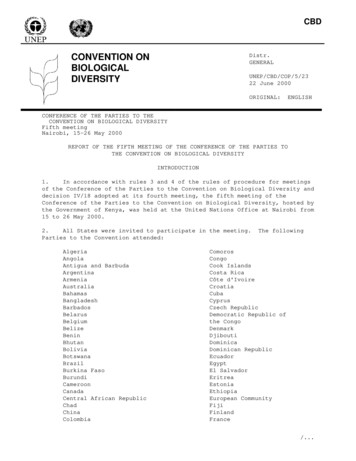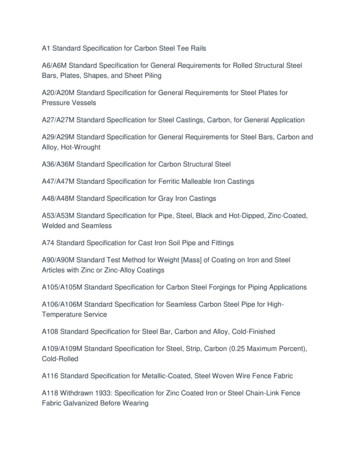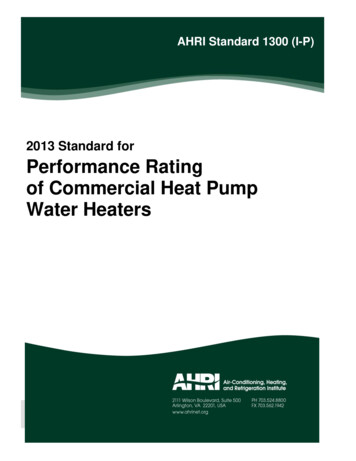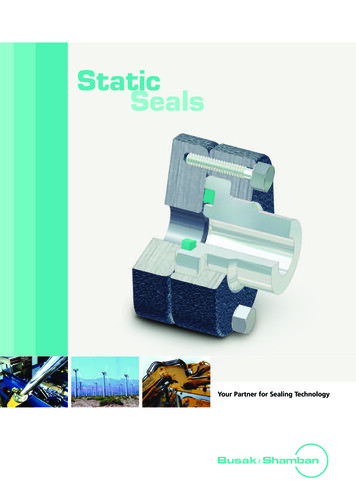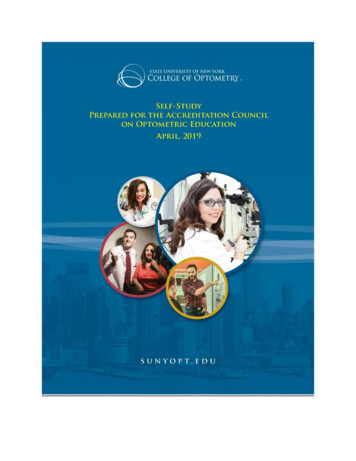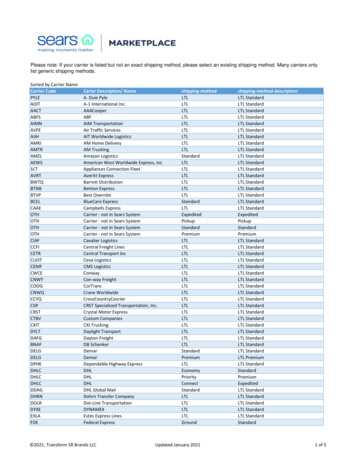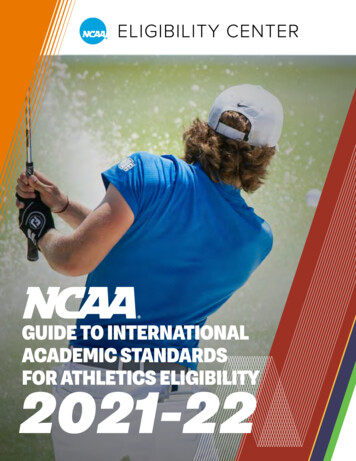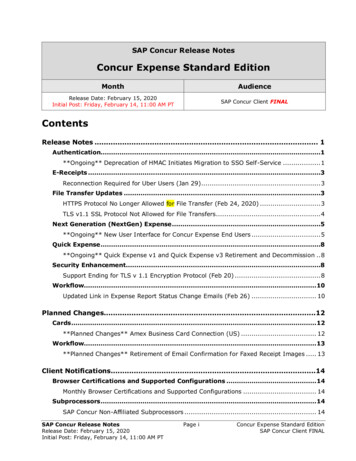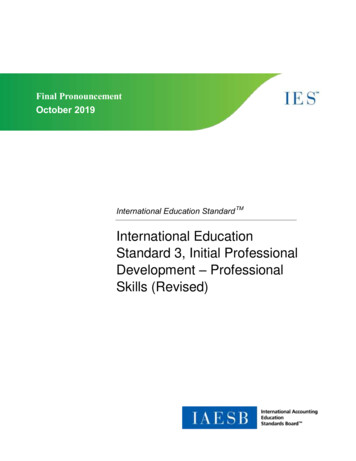
Transcription
Final PronouncementOctober 2019International Education Standard TMInternational EducationStandard 3, Initial ProfessionalDevelopment – ProfessionalSkills (Revised)
This document was developed and approved by the International Accounting Education StandardsBoard (IAESB ).The IAESB develops education standards, guidance, and information papers on pre-qualificationeducation, training of professional accountants, and continuing professional education and development.The objective of the IAESB is to serve the public interest by setting high-quality education standards forprofessional accountants and by facilitating the convergence of international and national educationstandards.The structures and processes that support the operations of the IAESB are facilitated by the InternationalFederation of Accountants (IFAC ).Copyright October 2019 by the International Federation of Accountants (IFAC). For copyright,trademark, and permissions information, please see page 12.
INTERNATIONAL EDUCATION STANDARD 3,INITIAL PROFESSIONAL DEVELOPMENT – PROFESSIONAL SKILLS(REVISED)CONTENTSParagraphIntroductionScope of this Standard . .1–4Effective Date . .5Objective . .6RequirementsLearning Outcomes for Professional Skills . .7Review of Professional Accounting Education Programs .8Assessment of Professional Skills . .9Explanatory MaterialScope of this Standard . .A1–A7Objective . .A8Learning Outcomes for Professional Skills . .A9–A14Review of Professional Accounting Education Programs . .A15–A16Assessment of Professional Skills . .A17–A19Appendix 1: Description of Levels of Proficiency
IES 3, INITIAL PROFESSIONAL DEVELOPMENT – PROFESSIONAL SKILLS (REVISED)IntroductionScope of this Standard (Ref: Para. A1–A7)1.This International Education Standard (IES) prescribes the learning outcomes for professional skillsthat aspiring professional accountants are required to achieve by the end of Initial ProfessionalDevelopment (IPD). Professional skills are the (a) intellectual, (b) interpersonal and communication,(c) personal, and (d) organizational skills that a professional accountant integrates with technicalcompetence and professional values, ethics, and attitudes to demonstrate professionalcompetence.2.This IES is addressed to International Federation of Accountants (IFAC) member bodies. IFACmember bodies have responsibility for ensuring that IPD meets the requirements of this IES. Inaddition, this IES may be helpful to educational organizations, employers, regulators, governmentauthorities, and any other stakeholders who support the learning and development of aspiringprofessional accountants.3.This IES specifies the competence areas and learning outcomes that describe the professionalskills required of aspiring professional accountants by the end of IPD. IES 2, Initial ProfessionalDevelopment – Technical Competence (Revised), and IES 4, Initial Professional Development –Professional Values, Ethics, and Attitudes (Revised), specify competence areas and learningoutcomes relevant to their areas of focus within IPD. Together, these IESs specify the competenceareas and learning outcomes that describe the professional competence required of aspiringprofessional accountants by the end of IPD.4.Definitions and explanations of the key terms used in the IES and the Framework for InternationalEducation Standards for Professional Accountants and Aspiring Professional Accountants (2015)are set out in the International Accounting Education Standards Board (IAESB) Glossary of Terms(Revised).Effective Date5.This IES is effective from January 1, 2021.Objective (Ref: Para. A8)6.The objective of this IES is to establish the professional skills that aspiring professional accountantsneed to develop and demonstrate by the end of IPD, in order to perform a role as a professionalaccountant.RequirementsLearning Outcomes for Professional Skills (Ref: Para. A9–A14)7.IFAC member bodies shall prescribe the learning outcomes for professional skills to be achieved byaspiring professional accountants by the end of IPD. These learning outcomes shall include thoselisted in Table A.4
IES 3, INITIAL PROFESSIONAL DEVELOPMENT – PROFESSIONAL SKILLS (REVISED)Table A: Learning Outcomes for Professional SkillsCompetence Area(Level of Proficiency1)(a) Intellectual(Intermediate)Learning Outcomes(i) Evaluate data and information from a variety of sources andperspectives through research, integration, and analysis.(ii) Apply critical thinking skills to solve problems, informjudgments, make decisions, and reach well-reasonedconclusions.(iii) Identify when it is appropriate to consult with specialists.(iv) Recommend solutions to unstructured, multi-faceted problems.(v) Respond effectively to changing circumstances or newinformation to solve problems, inform judgments, make decisions,and reach well-reasoned conclusions.(b) Interpersonal andcommunication(Intermediate)(i) Demonstrate collaboration, cooperation, and teamwork whenworking towards organizational goals.(ii) Communicate clearly and concisely when presenting, discussing,and reporting in formal and informal situations.(iii) Demonstrate awareness of cultural and language differences inall communication.(iv) Apply active listening and effective interviewing techniques.(v) Apply negotiation skills to reach solutions and agreements.(vi) Apply consultative skills to minimize or resolve conflict, solveproblems, and maximize opportunities.(vii) Present ideas and influence others to provide support andcommitment.(c) Personal(Intermediate)(i) Demonstrate a commitment to lifelong learning.(ii) Set high personal standards of performance and monitor throughreflective activity and feedback from others.(iii) Manage iv) Anticipate challenges and plan potential solutions.(v) Apply an open mind to new opportunities.(vi) Identify the potential impact of personal and organizational bias.1The level of proficiency for a competence area to be achieved by the end of IPD (as outlined in Appendix 1).5
IES 3, INITIAL PROFESSIONAL DEVELOPMENT – PROFESSIONAL SKILLS (REVISED)Competence Area(Level of Proficiency1)(d) Organizational(Intermediate)Learning Outcomes(i) Undertake assignments in accordance with established practicesto meet prescribed deadlines.(ii) Review own work and that of others to determine whether itcomplies with the organization’s quality standards.(iii) Apply people management skills to motivate and develop others.(iv) Apply delegation skills to deliver assignments.(v) Apply leadership skills to influence others to work towardsorganizational goals.Review of Professional Accounting Education Programs (Ref: Para. A15–A16)8.IFAC member bodies shall regularly review and update professional accounting educationprograms that are designed to achieve the learning outcomes in this IES.Assessment of Professional Skills (Ref: Para. A17–A19)9.IFAC member bodies shall establish appropriate assessment activities to assess the professionalskills of aspiring professional accountants.6
IES 3, INITIAL PROFESSIONAL DEVELOPMENT – PROFESSIONAL SKILLS (REVISED)Explanatory MaterialScope of this Standard (Ref: Para. 1–4)A1.An aspiring professional accountant is an individual who has commenced a professional accountingeducation program as part of IPD. IPD is the learning and development through which aspiringprofessional accountants first develop competence leading to performing a role as a professionalaccountant. IPD builds on general education and includes professional accounting education,practical experience, and assessment. IPD continues until aspiring professional accountants candemonstrate the professional competence required for their chosen roles in the accountancyprofession.A2.Internationally, there are significant legal and regulatory differences that determine the point ofqualification (or licensing) of professional accountants. Each IFAC member body may define theappropriate relationship between the end of IPD and the point of qualification (or licensing) for itsmembers.A3.Professional competence can be described and categorized in many different ways. Within theIESs, professional competence is the ability to perform a role to a defined standard. Professionalcompetence goes beyond knowledge of principles, standards, concepts, facts, and procedures; it isthe integration and application of (a) technical competence, (b) professional skills, and (c)professional values, ethics, and attitudes.A4.The inclusion of professional skills in IPD lays the base for performing a role as a professionalaccountant. Further development of professional skills is a focus of Continuing ProfessionalDevelopment (CPD), which is covered in IES 7, Continuing Professional Development (Revised).A5.Within this IES, professional skills are categorized into four competence areas:(a)Intellectual relates to the ability of a professional accountant to solve problems, makedecisions, adapt to change, and exercise professional judgment;(b)Interpersonal and communication relate to the ability of a professional accountant to work andinteract effectively with others;(c)Personal relates to the personal attitudes and behavior of a professional accountant; and(d)Organizational relates to the ability of a professional accountant to work effectively with orwithin an organization to obtain the optimal results or outcomes from the people andresources available.7
IES 3, INITIAL PROFESSIONAL DEVELOPMENT – PROFESSIONAL SKILLS (REVISED)A6.A competence area is a category for which a set of related learning outcomes can be specified.Competence areas within professional skills include intellectual and organizational; competenceareas within technical competence include financial accounting and reporting, taxation, andeconomics; and competence areas within professional values, ethics, and attitudes include ethicalprinciples as well as professional skepticism and professional judgment.A7.Learning outcomes establish the content and the depth of knowledge, understanding, andapplication required for each specified competence area. Learning outcomes can be achievedwithin the context of a work environment or professional accounting education program.Objective (Ref: Para. 6)A8.Establishing the professional skills that aspiring professional accountants need to develop anddemonstrate by the end of IPD serves several purposes. It protects the public interest, enhances thequality of the work of professional accountants and promotes the credibility of the accountancyprofession.Learning Outcomes for Professional Skills (Ref: Para. 7)A9.Table A lists the learning outcomes for professional skills to be achieved by aspiring professionalaccountants by the end of IPD, regardless of their intended future accounting specialization or role.These learning outcomes provide the base to enable professional accountants to developspecializations in different accounting roles, for example an audit engagement partner or a taxationspecialist.A10. In the design of professional accounting education programs, the four competence areas listed inTable A may not be identical to the names of prescribed courses or subjects. Also, the learningoutcomes associated with one competence area (for example, organizational) may be achievedacross more than one course or subject. The achievement of some learning outcomes (forexample, those within intellectual) may extend across several different courses or subjects, none ofwhich may be devoted solely to that competence area.A11. There are many ways to describe and classify levels of proficiency. The description developed bythe IAESB is provided in Appendix 1, Description of Levels of Proficiency.A12. In Table A, each competence area has been assigned a level of proficiency that aspiring professionalaccountants are expected to achieve by the end of IPD. This level of proficiency indicates thecontext in which the relevant learning outcomes are expected to be demonstrated. Together, thelearning outcomes and the level of proficiency of the competence area provide information to helpIFAC member bodies design their professional accounting education programs.A13. In professional accounting education programs, an IFAC member body may: (a) include additionalcompetence areas; (b) increase the level of proficiency for some competence areas; or (c) developadditional learning outcomes that are not specified in this IES. This may occur when an IFACmember body prepares aspiring professional accountants to work within a particular industry sector(for example, the public sector) or for a particular role (for example, a management accountant oran auditor).A14. IFAC member bodies, educators, and other stakeholders are encouraged to identify the mostappropriate approach to learning and development for professional skills, taking into considerationthe national and cultural environment. An appropriate approach is likely to include a mixture oflearning and development activities which combine structured learning programs and practical8
IES 3, INITIAL PROFESSIONAL DEVELOPMENT – PROFESSIONAL SKILLS (REVISED)experience. For example, practical experience supervisors play an important role in helpingaspiring professional accountants to develop professional skills within the workplace.Review of Professional Accounting Education Programs (Ref: Para. 8)A15. Professional accounting education programs are designed to support aspiring professionalaccountants to develop the appropriate professional competence by the end of IPD. Such programsmay include formal education delivered through qualifications and courses offered by universities,other higher education providers, IFAC member bodies, and employers, as well as workplacetraining. The design of the professional accounting education programs may involve substantiveinput from stakeholders other than IFAC member bodies.A16. The requirement to review and update professional accounting education programs on a regularbasis reflects the rapidly-changing and complex environment within which professional accountantsoperate. A typical review cycle may be three to five years, but it may be appropriate to undertake amore frequent review, for example to take account of changes in legislation, regulations, andstandards relevant to professional accountants.Assessment of Professional Skills (Ref: Para. 9)A17. IES 6, Initial Professional Development – Assessment of Professional Competence (2015),provides the principles that apply to the design of assessment activities used to assess theprofessional skills and other elements of professional competence.A18. Various assessment activities can be used to assess the professional skills of aspiring professionalaccountants. Work-based simulations or group exercises are examples of activities that enableaspiring professional accountants to develop and demonstrate achievement of learning outcomesrelated to professional skills, within a professional accounting education program. Practicalexperience also enables aspiring professional accountants to participate in assessment activities todemonstrate their professional skills. Examples of such activities include: (a) keeping a diary, (b)participating in 360 degree assessments, (c) compiling portfolios of evidence of achievement oflearning outcomes, or (d) being monitored by a practical experience supervisor.A19. Assessment of professional skills in the workplace may require a different approach to that ofwritten examinations in order to achieve high levels of reliability, validity, equity, transparency, andsufficiency. For example, assessment design may include:(a)Specification of learning outcomes that are clear and detailed in order to minimize ambiguityand increase the reliability and transparency of the assessment;(b)Training of workplace assessors in order to achieve consistency between assessors andequity between aspiring professional accountants; and(c)Creation of work-based simulations in order to provide sufficient, equitable, and reliableassessments of professional skills.9
IES 3, INITIAL PROFESSIONAL DEVELOPMENT – PROFESSIONAL SKILLS (REVISED)Appendix 1Description of Levels of ProficiencyThis description of levels of proficiency supports the IAESB’s use of learning outcomes in its publicationssuch as International Education Standards (IES) 2, 3, and 4. It provides descriptions of three levels ofproficiency. These descriptions, together with the learning outcomes, provide information to help IFACmember bodies design their professional accounting education programs for a variety of professionalaccounting roles and specializations.Level of Proficiency DescriptionFoundationTypically, learning outcomes in a competence area focus on: Defining, explaining, summarizing, and interpreting the underlyingprinciples and theories of relevant areas of technical competence tocomplete tasks while working under appropriate supervision; Performing assigned tasks by using the appropriate professional skills; Solving simple problems, and referring complex tasks or problems tosupervisors or those with specialized expertise; and Providing information and explaining ideas in a clear manner, using oraland written communications.Recognizing the importance of professional values, ethics, and attitudes inperforming assigned tasks;Learning outcomes at the foundation level relate to work environments that arecharacterized by low levels of ambiguity, complexity, and uncertainty.IntermediateTypically, learning outcomes in a competence area focus on: Independently applying, comparing, and analyzing underlying principlesand theories from relevant areas of technical competence to completework assignments and make decisions; Combining technical competence and professional skills to complete workassignments; Applying professional values, ethics, and attitudes to work assignments;and Presenting information and explaining ideas in a clear manner, using oraland written communications, to accounting and non-accountingstakeholders.Learning outcomes at the intermediate level relate to work environments that arecharacterized by moderate levels of ambiguity, complexity, and uncertainty.10
IES 3, INITIAL PROFESSIONAL DEVELOPMENT – PROFESSIONAL SKILLS (REVISED)Level of Proficiency DescriptionAdvancedTypically, learning outcomes in a competence area focus on: Selecting and integrating principles and theories from different areas oftechnical competence to manage and lead projects and work assignmentsand to make recommendations appropriate to stakeholder needs; Integrating technical competence and professional skills to manage andlead projects and work assignments; Making judgments on appropriate courses of action drawing onprofessional values, ethics, and attitudes; Assessing, researching, and resolving complex problems with limitedsupervision; Anticipating, consulting appropriately, and developing solutions to complexproblems and issues; and Consistently presenting and explaining relevant information in apersuasive manner to a wide-range of stakeholders.Learning outcomes at the advanced level relate to work environments that arecharacterized by high levels of ambiguity, complexity, and uncertainty.11
COPYRIGHT, TRADEMARK, AND PERMISSIONS INFORMATIONInternational Education Standards, Exposure Drafts, Consultation Papers, and other IAESB publicationsare published by, and copyright of, IFAC.The IAESB and IFAC do not accept responsibility for loss caused to any person who acts or refrains fromacting in reliance on the material in this publication, whether such loss is caused by negligence orotherwise.The IAESB logo, ‘International Accounting Education Standards Board’, ‘IAESB’, ‘International EducationStandards’, ‘IES’, the IFAC logo, ‘International Federation of Accountants’, and ‘IFAC’ are trademarks andservice marks of IFAC.Copyright October 2019 by the International Federation of Accountants (IFAC). All rights reserved.Permission is granted to make copies of this work to achieve maximum exposure and feedback providedthat each copy bears the following credit line: “Copyright October 2019 by the International Federationof Accountants (IFAC). All rights reserved. Used with permission of IFAC. Permission is granted to makecopies of this work to achieve maximum exposure and feedback.” Contact permissions@ifac.org.ISBN: 978-1-60815-423-4Published by:12
the integration and application of (a) technical competence, (b) professional skills, and (c) professional values, ethics, and attitudes. A4. The inclusion of professional skills in IPD lays the base for performing a role as a professional accountant. Further development of professional skills is a focus of Continuing Professional
